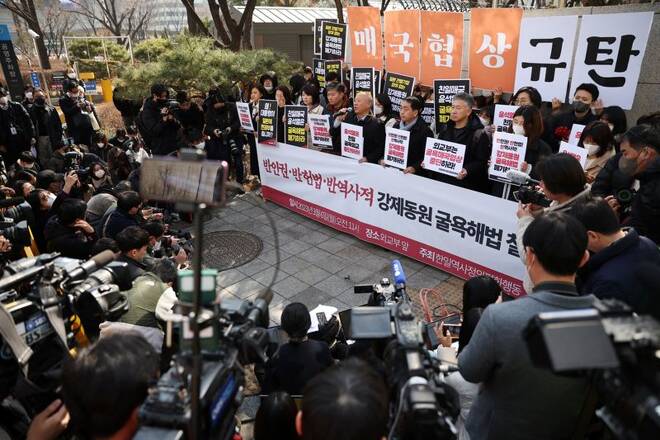Advertisement
Advertisement
Factbox-South Korea moves to resolve historical, legal disputes with Japan
By:
SEOUL (Reuters) - South Korea on Monday proposed establishing a public foundation to compensate victims of wartime forced labour by Japan, to help resolve strained ties between the two countries.
SEOUL (Reuters) – South Korea on Monday proposed establishing a public foundation to compensate victims of wartime forced labour by Japan, to help resolve strained ties between the two countries.
Efforts to overcome historical disputes between South Korea and Japan were renewed under South Korean President Yoon Suk Yeol, who took office in May, with both countries vowing to improve ties.
– Relations between the two North Asian U.S. allies have been strained over disputes dating to Japan’s 1910-1945 occupation of Korea. Koreans accuse Japan of forcing women to work in wartime brothels for the Japanese military and using forced labour, among other abuses.
– Various measures over the years have attempted to resolve the issues. Japan says the matter of any compensation for forced labour was settled under a 1965 treaty normalizing diplomatic ties and providing South Korea with economic assistance.
– In 2015, South Korea and Japan reached a settlement under which Tokyo issued an official apology to “comfort women” who say they were enslaved in wartime brothels, and provided 1 billion yen ($9.23 million) to a fund to help the victims. But then-South Korean President Moon Jae-in decided to dissolve the fund in 2018, effectively scrapping the agreement as he said it did not to do enough to consider victims’ concerns.
– In 2018 South Korea’s Supreme Court ordered Japan’s Nippon Steel & Sumitomo Metal Corp (5401.T) and Mitsubishi Heavy Industries (7011.T) to compensate some wartime forced labourers. Tokyo has warned of serious repercussions if the orders are enforced.
– Relations deteriorated in 2019 when Japan restricted exports of high-tech material to South Korea. At the time Seoul threatened to pull out of an intelligence-sharing deal with Tokyo, but backed down at the last minute under pressure from the United States, which has pushed for its two allies to mend ties.
– Over the years some South Koreans have boycotted Japanese products and cancelled planned vacations to the country. Seoul regularly lodges complaints over the way history is recounted in some Japanese textbooks, and there have been flare-ups over the “Rising Sun” flag seen as a symbol of imperial Japan. Tokyo has accused South Korean leaders of exacerbating tensions to score political points.
– The two countries also have a territorial dispute over a cluster of windswept volcanic islets, known as Dokdo in Korea and Takeshima in Japan. The islets are controlled by Seoul with a small contingent of coast guards, and are also claimed by Tokyo.
– The United States has pressed both countries to resolve the disputes to better counter rising threats from China and North Korea, among other regional challenges. Under Yoon, South Korea has resumed trilateral military drills and agreed to more intelligence sharing on things like tracking ballistic missile launches from North Korea.
(Reporting by Josh Smith)
About the Author
Reuterscontributor
Reuters, the news and media division of Thomson Reuters, is the world’s largest international multimedia news provider reaching more than one billion people every day. Reuters provides trusted business, financial, national, and international news to professionals via Thomson Reuters desktops, the world's media organizations, and directly to consumers at Reuters.com and via Reuters TV. Learn more about Thomson Reuters products:
Advertisement
